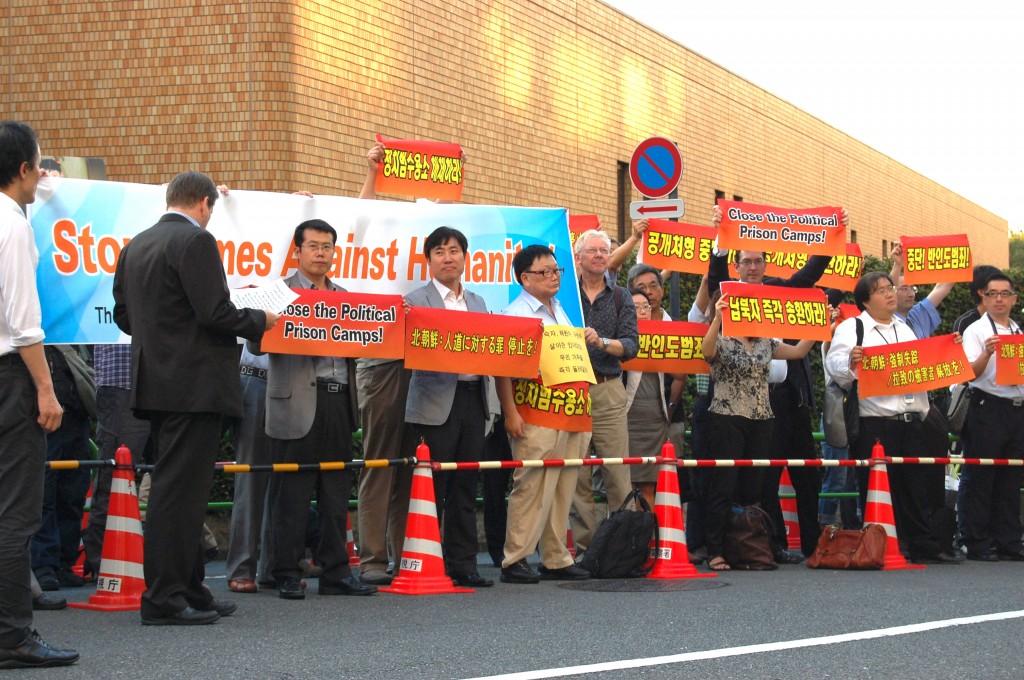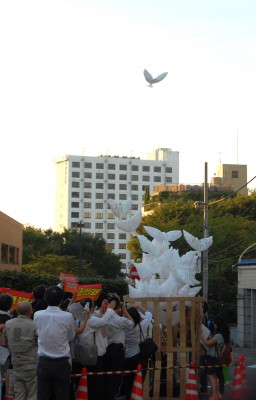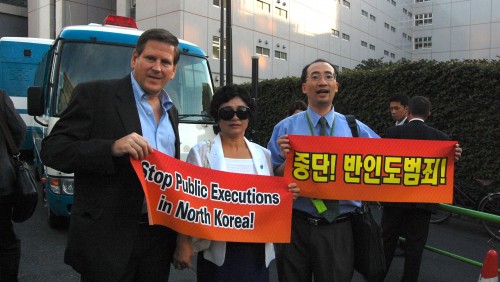63 years ago today, everyone’s favorite totalitarian regime (and land of our Dear Leader!), was founded.
To mark the anniversary, NGOs committed to humanitarian concerns in North Korea have joined forces, launching The International Coalition to Stop Crimes Against Humanity in North Korea (ICNK) at a press conference yesterday at the Foreign Correspondents Club. The press conference was followed by a protest held in front of the de-facto North Korean embassy in Tokyo (Chosen-Soren), where the coalition demanded that every one of the more than 200,000 prisoners held in political camps be released. (*Japan and the US both consider North Korea a threat to national security. The recent executive order by President Obama targeting the yakuza was intended to be an indirect blow to North Korea by cutting off their funding. See notes at end of article)

ICNK unites 40 groups committed to stopping human rights abuses in North Korea, marking a first in the humanitarian efforts to hold North Korea accountable; up until now, NGOs committed to this cause were working more or less separately. The organization brings what was once a mostly regional effort to a global scale, by linking organizations across the continents. It is hoped that these groups, banded together, can generate exponential strength as a unified front.
According to a former UN special rapporteur on North Korean human rights, crimes against humanity in the regime are “in its own category”. Vitit Muntarbhorn, who worked for 6 years in the post, estimates that the camps hold 200,000 to 300,000 prisoners, who are subject to systematic torture, near starvation, and systematic rape of female prisoners. Those outside the camps, depending on the depth of their allegiance to dictator Kim Jong-Il, fare only marginally better in the “state of fear”; Muntarbhorn’s 2009 investigation discovered that 40% of North Koreans are starving. Public executions are believed to have increased four or five fold in the past ten years. The full investigation can be read here.
The past 15 years have been dedicated to promoting awareness of these issues. However, Human Rights Watch Asia Director Phil Robertson stresses that the ICNK “is going to be an action coalition”. Coalition members laid out their strategy at the press conference.
The coalition’s foremost concern is lobbying for a UN “commission of inquiry” of North Korea. Rather than having a single rapporteur monitoring the situation from afar, such a commission would lend “a group of leading experts and jurists, from around the world, selected and mandated by the UN” the authority to demand entry into the country for an investigation. Members stressed that they are lobbying strongly for an independent and impartial investigation.
The press was skeptical. Given the relative economic and political isolation of the country, how can we force North Korea to change, much less to cooperate in an investigation? Indeed, North Korea has never allowed the UN special rapporteur into the country.
Coalition members were realistic about the likelihood they will be granted access in North Korea to carry out an investigation. However, they were seemed confident they could nevertheless affect change. The President of Seoul-based Open North Korea, Tae Keung Ha, points out that international pressure in the past has indeed led to changes in the regime. After the issue of prisoner camps was made known, the number of camps decreased from ten to six. As another concrete example, 20 years ago, Amnesty International tried to visit one prison; though they were not allowed in, the camp was abolished immediately after their attempted visit.

Ha’s comment that “Kim Jong-Il considers himself as an international leader” received laughs of surprise from the press. “He makes a lot of his image in the international community. So, the more that we talk about it, the more international pressure, the more they will respond.”
Mr. Robertson acknowledges the obstacles; “It is a failure of political will”. He mentions the usual excuses given by bureaucrats- Kim Jong-Il’s shaky grip on reality, his nuclear capacity, the fear of another attack across the DMZ (the demilitarized zone), even attacks carried out by the North Korean government against its own people. Nevertheless, council members believe that “the machinery of the UN would have the capacity to make a wide range of recommendations on how to end impunity in North Korea”.
According to Benedict Rogers of Christian Solidarity Worldwide (which has also done its own investigation into North Korean human rights violations), there are four ways of securing a commission of inquiry: through the security council, the human rights council, the general assembly, and the secretary general. He adds, “We are not specifying categorically which we will use, but we believe it will likely succeed in the human rights council or the general assembly, where China and Russia do not have veto power.” He also acknowledges that China and Russia will “still remain major players”, but that there may be ways to soften any opposition they bring. It also seems that there may not be as much individual support for the regime within the countries that publicly offer it support; according to a council member, one Russian diplomat privately described North Korea as “the neighbor from hell”.
The annual UN Human Rights Resolution is passed in either November or December; it is in this resolution that the drafting countries (including Japan, South Korea, the EU, Canada) will hopefully include a call for the commission to be created. The Japanese government plays a very critical role here – it authors the initial draft of this resolution.
Upon completion, the press conference moved to the Chosen-Soren, where protestors outside the embassy held signs in English, Korean, and Japanese, and led chants in all three languages. A letter to Kim Jong-Il, asking for entrance into the country to conduct the investigation, was successfully handed over to an official inside the embassy.

Ms. Kim Hye Sook, survivor of a political camp, attended to show support for the coalition. Having been detained from the time she was 13 years old, it was only when she was released 28 years later that she was informed of her crime: her grandfather had escaped to South Korea, and she was considered guilty by association. The BBC has done an excellent interview with Ms. Sook. When I spoke with her, however, she wanted readers of the blog to know that North Koreans are fed propaganda about the Japanese people – and that it was only upon coming to Tokyo that she understood the lies she had been told. She feels gratitude for the work that Japanese NGOs are doing for this cause.
*Jake’s note: On July 24th, President Barack Obama declared war on the yakuza (ヤクザ)aka The Japanese mafia, in an executive order. According to several sources, part of the reason for doing was that many of the yakuza are North Korean Japanese with affiliations to North Korea. There have been several cases where yakuza members were found to be importing drugs and guns from North Korea. Yakuza groups continue to provide them with a source of revenue. In his executive order Obama noted, “(the yakuza) are becoming increasingly sophisticated and dangerous to the United States; they are increasingly entrenched in the operations of foreign governments and the international financial system, thereby weakening democratic institutions, degrading the rule of law, and undermining economic markets. These organizations facilitate and aggravate violent civil conflicts and increasingly facilitate the activities of other dangerous persons. I therefore determine that significant transnational criminal organizations constitute an unusual and extraordinary threat to the national security, foreign policy, and economy of the United States, and hereby declare a national emergency to deal with that threat.” The threat the yakuza pose to US National Security is signficantly related to their dealings with North Korea.
Hi, how can I find the book by Kim Hye Sook: A Concentration Camp Retold inTears
I’ll have to ask Stephanie.